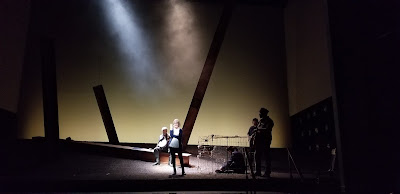Making Myths: An Interview with Father Comes Home Director Liz Diamond
By Simon Hodgson
When the first time director Liz Diamond picked up a script by Suzan-Lori Parks, she was smitten. “I fell in love with her work,” says Diamond, “with the stories she was telling, with her voice as a writer, and with Suzan-Lori herself—this blazingly smart, fierce, funny, vibrant, young artist.” In 1989, Diamond directed Parks’s Imperceptible Mutabilities in the Third Kingdom at Brooklyn Arts and Cultural Association (BACA) Downtown, launching a partnership that has lasted 30 years. As she prepared to direct Father Comes Home from the Wars (Parts 1, 2 & 3) at A.C.T., the chair of directing at Yale School of Drama spoke to us about the images that have inspired her design, her collaboration with the playwright, and why Parks’s play matters now.
 |
| Director Liz Diamond. Photo by Joan Marcus. |
What was your initial reaction to Parks’s work?
The playwright Mac Wellman sent me her play Imperceptible Mutabilities in the Third Kingdom. As I began to read, my understanding of dramatic structure was blown away. Here was a work by an American writer playing with what it means to be a play! Suzan-Lori was using popular and poetic forms of speech—rhythmic wordplay, jokes within jokes, puns—to such a radical degree. She was messing with theatrical time: telling a story across great swaths of history, and through characters who morphed into others from one part of the play to the next. I had never read a play by a writer that so gleefully deconstructed and reconstructed time, space, and character.
What impact does the Odyssey have on Father Comes Home?
I think that Suzan-Lori would like us to understand that she’s not just drawing on epics from across the world, but creating a new one, hers and ours. “When you think about this play,” she said to me, “you want to say to yourself: ‘As the Agamemnon [the classic Greek play by Aeschylus] was to the Trojan War, so Father Comes Home is to the Civil War.’” It’s a kind of mythmaking. The Odyssey is telling the story of the return of a hero, and this play is too. Suzan-Lori riffs—on the Homeric epic, the Bhagavad Gita, and the American tall tale—and ingeniously mixes lyric poetry with 21st-century vernacular, weaving it together with song to construct a deeply moving and subversively funny story about the struggle of an enslaved African American man to recognize, to understand, and ultimately to practice freedom.
The playwright Mac Wellman sent me her play Imperceptible Mutabilities in the Third Kingdom. As I began to read, my understanding of dramatic structure was blown away. Here was a work by an American writer playing with what it means to be a play! Suzan-Lori was using popular and poetic forms of speech—rhythmic wordplay, jokes within jokes, puns—to such a radical degree. She was messing with theatrical time: telling a story across great swaths of history, and through characters who morphed into others from one part of the play to the next. I had never read a play by a writer that so gleefully deconstructed and reconstructed time, space, and character.
What impact does the Odyssey have on Father Comes Home?
I think that Suzan-Lori would like us to understand that she’s not just drawing on epics from across the world, but creating a new one, hers and ours. “When you think about this play,” she said to me, “you want to say to yourself: ‘As the Agamemnon [the classic Greek play by Aeschylus] was to the Trojan War, so Father Comes Home is to the Civil War.’” It’s a kind of mythmaking. The Odyssey is telling the story of the return of a hero, and this play is too. Suzan-Lori riffs—on the Homeric epic, the Bhagavad Gita, and the American tall tale—and ingeniously mixes lyric poetry with 21st-century vernacular, weaving it together with song to construct a deeply moving and subversively funny story about the struggle of an enslaved African American man to recognize, to understand, and ultimately to practice freedom.
 |
| Director Liz Diamond in rehearsal for the 2018 production of Father Comes Home from the Wars (Parts 1, 2 & 3) at Yale Repertory Theatre. Photo by Kat Yen. |
The question is alive in all of us, and achingly so: what does it cost to be free? That paradox—why should freedom cost anything?—is at the heart of the play. With our country so divided by racism, xenophobia, and grotesque economic and social inequality, it feels more important than ever to stage Parks’s great play. We need her unflinchingly honest and humane plays on our stages, to show us, with all her warm humor and fierce compassion, what it costs in America to “own your own self.” Throughout her artistic life, Suzan-Lori has tried to practice freedom, and that commitment is alive in this play, and in all her work.
Father Comes Home from the Wars (Parts 1, 2 & 3) runs through May 20 at A.C.T.’s Geary Theater. Click here to purchase tickets. Want to learn more about the history behind the play? Order a copy of Words on Plays, A.C.T.'s in-depth performance guide series.

